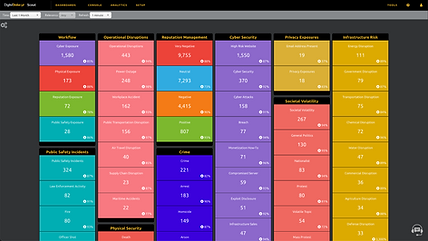
Societal Risk Taxonomy for Societal Intelligence
Societal Security Taxonomy for navigating complex social landscapes. Understand critical societal risks, strategic response measures, and best practices in managing social dynamics and community relations.
Overview of Societal Intelligence
Societal Intelligence involves the collection, analysis, and dissemination of information related to social trends, cultural shifts, and community dynamics that can impact organizations and their operations. This discipline is crucial for understanding and navigating the complex social environments in which organizations operate, managing community relations, and addressing societal issues that may affect business practices and reputation.
Components of Societal Intelligence
Social Trend Analysis
This component focuses on identifying and analyzing emerging social trends, cultural movements, and shifts in public opinion that may impact organizational strategies and operations.
Community Dynamics Assessment
This aspect involves understanding the unique characteristics, needs, and concerns of the communities in which an organization operates or serves.
Social Impact Evaluation
This component deals with assessing the organization's impact on society and identifying opportunities for positive social contribution and risk mitigation.
Importance of Societal Intelligence
Societal Intelligence is vital because it:
1. Enhances Social License to Operate
Societal intelligence helps maintain:
Community acceptance and support
Positive relationships with local stakeholders
Alignment with societal values and expectations
2. Enables Proactive Risk Mitigation
By providing insights into societal trends and issues, it allows organizations to:
Anticipate and address potential social conflicts
Adapt strategies to changing social norms
Develop socially responsible business practices
3. Supports Strategic Decision-Making
Societal intelligence informs:
Market entry and expansion decisions
Product development and marketing strategies
Corporate social responsibility initiatives
4. Enhances Organizational Resilience
Societal intelligence contributes to resilience by:
Informing community engagement strategies
Guiding the development of culturally sensitive practices
Supporting continuous improvement of social performance
5. Fosters Innovation and Opportunity
By understanding societal needs and trends, this intelligence supports:
Identification of new market opportunities
Development of socially beneficial products and services
Creation of shared value for business and society
Sample Societal Event Types/Descriptions
1. Civil Unrest
Incidents of public disorder or protest, such as:
Mass demonstrations
Riots or violent protests
General strikes or civil disobedience
2. Social Movements
Organized efforts to promote social change, including:
Rights-based movements (e.g., civil rights, women's rights)
Environmental activism
Political reform campaigns
3. Cultural Shifts
Significant changes in societal values or norms, such as:
Changing attitudes towards diversity and inclusion
Shifts in work culture and employment expectations
Evolving consumer preferences and behaviors
4. Demographic Changes
Alterations in population characteristics, including:
Aging populations
Urbanization trends
Changes in ethnic or religious composition
5. Technological Impact on Society
Social changes driven by technological advancements, such as:
Digital transformation of social interactions
Impact of automation on employment
Privacy and data ethics concerns
Sample Societal Article Titles
"Breaking: Massive Protests Erupt in Major Cities Over Economic Inequality"
"Gen Z Reshapes Workplace Culture: Companies Scramble to Adapt"
"Rising Nationalism Challenges Globalization: Multinationals Face New Reality"
"Climate Activism Goes Mainstream: Businesses Feel Pressure to Act"
"Social Media Boycott Movement Gains Traction, Testing Corporate Responses"
Sample Courses of Societal Action/Recommendations
1. Immediate Social Issue Response
Assess the organization's position relative to the social issue
Engage with relevant stakeholders and community leaders
Develop a clear stance and communication strategy
2. Community Engagement Enhancement
Implement regular community dialogue sessions
Develop local partnerships for social impact initiatives
Invest in programs that address community needs and concerns
3. Social Impact Strategy Development
Conduct a comprehensive social impact assessment
Align business strategies with societal needs and expectations
Develop measurable goals for positive social contribution
4. Cultural Sensitivity and Diversity Initiatives
Implement organization-wide cultural competence training
Review and update policies to promote inclusivity and diversity
Engage diverse perspectives in decision-making processes
5. Long-term Societal Trend Monitoring
Establish a dedicated social trends monitoring system
Conduct regular scenario planning for potential societal shifts
Develop adaptive strategies to align with evolving social expectations